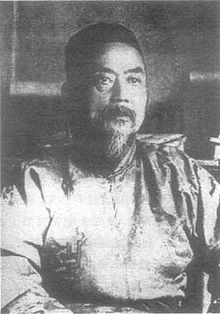Gu Hongming
Gu Hongming | |
|---|---|
University of Leipzig, University of Paris | |
| Occupation(s) | Scholar, Professor |

Gu Hongming in his time known as Ku Hung-ming (
Life
Gu Hongming was born in
]
He returned to Penang in 1880, and soon joined the
Leo Tolstoy, whom he had befriended, and Gu were both opposed to the Hundred Days' Reform, which was led by prominent reformist intellectuals of the time, including Kang Youwei.[4]
From 1905 to 1908, he was the director of the Huangpu River Authority (上海浚治黃浦江河道局) in Shanghai. He served in the Imperial Foreign Ministry from 1908 to 1910, then as the president of the Nanyang Public School, the forerunner of Shanghai Jiao Tong University. He resigned the latter post in 1911 as a sign of his loyalty to the fallen imperial Qing government. In 1915, he became a professor at Peking University. Beginning in 1924 he lived in Japan and Japanese-administered Taiwan for three years as a guest lecturer in Oriental cultures. Then he returned to live in Beijing until his death on 30 April 1928 at the age of 72.
An advocate of monarchy and Confucian values, preserving his
He was fluent in English, Chinese, Hokkien, German, Russian and French, and understood Italian, Ancient Greek, Latin, Japanese and Malay. He acquired Chinese only after his studies in Europe, and was said to have bad Chinese hand-writing. However, his command of the language was far above average. He penned several Chinese books, including a vivid memoir recollecting his days as an assistant for Zhang Zhidong.
His character appeared in the drama "Towards the Republic".[6]
Works
His English works include:
- Papers from a Viceroy's Yamen: a Chinese Plea for the Cause of Good Government and True Civilization (1901)[7]
- Et nunc, reges, intelligite! The Moral Causes of the Russo-Japanese War (1906)
- The Universal Order or The Conduct of Life (1906)
- The Story of a Chinese Oxford Movement (1910)
- The Spirit of the Chinese People (1915)[8]
He translated some of the
- The Discourses and Sayings of Confucius (1898; Chinese: 論語; pinyin: Lunyu)
- The Universal Order or Conduct of Life (1906; Chinese: 中庸; pinyin: Zhongyong)
- Higher Education (1915; Chinese: 大學; pinyin: Daxue)
He rendered William Cowper's narrative poem The Diverting History of John Gilpin into classical Chinese verse (known as 癡漢騎馬歌).
References
- ^ Liu, Suyong (22 July 2013). "'The eccentric' Gu Hongming". Chinese Social Sciences Today (478).
- ISBN 978-1317179283.
- ^ Müller, Gotelind (January 2006). "Gu Hongming (1857-1928) und Chinas Verteidigung gegen das Abendland" [Gu Hongming (1857-1928) and China’s defence against the occident] (PDF). Orientierungen. Zeitschrift zur Kultur Asiens: 6.
- ^ Lee 2005, p. 10.
- ^ "The Late Mr. Ku Hung-Ming," in Wen Yuan-ning, and others, "Imperfect Understanding: Intimate Portraits of Modern Chinese Celebrities," edited by Christopher Rea (Amherst, MA: Cambria Press, 2018), p. 72.
- ISBN 978-3825807870.
- ^ Gu, Hongming (1901). Papers from a Viceroy's Yamen: A Chinese Plea for the Cause of Good Government and True Civilization in China. Shanghai Mercury.
- ISBN 978-1627740111.
Further reading
- Du, Chunmei (2019). Gu Hongming's Eccentric Chinese Odyssey. University of Pennsylvania Press.
- Huang Xingtao 黃兴涛 (1995). Wenhua guaijie Gu Hongming (文化怪杰辜鸿铭 "Gu Hongming: a cultural eccentric"). Beijing: Zhonghua Book Company.
- Kong Qingmao 孔慶茂 (1996). Gu Hongming pingzhuan (辜鴻銘評傳 "A biography of Gu Hongming"). Nanchang: Baihuazhou wenyi chubanshe.
External links
- (in Chinese) Biography and related articles
- http://heavyangloorthodox.blogspot.com/2017/04/gu-hongmings-commentary-on-confucian-way.html
- https://cpciti.wordpress.com/2015/05/06/gu-hongming/
- WorldCat Ku, Hung-ming
- Internet Archive, "Gu Hongming." Free internet copies of his works.
